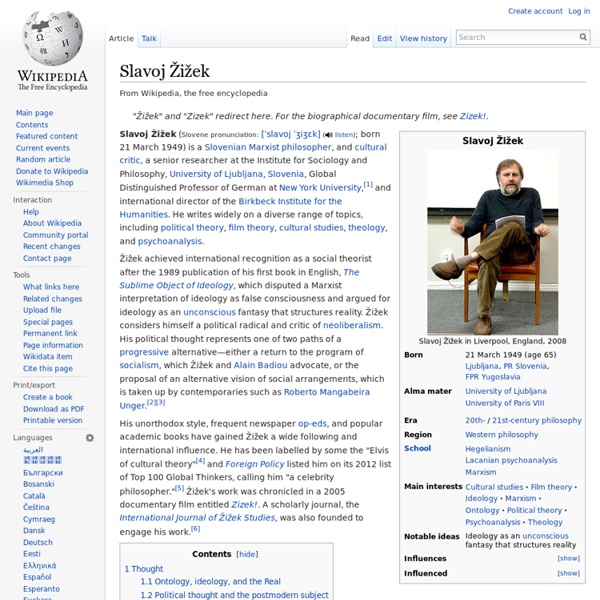Slavoj Zizek: Capitalism with Asian values - Talk to Al Jazeera
From the Middle East to the streets of London and cities across the US there is a discontent with the status quo. Whether it is with the iron grip of entrenched governments or the widening economic divide between the rich and those struggling to get by. But where are those so hungry for change heading? How profound is their long-term vision to transform society?
Luc Boltanski
Luc Boltanski (born 1940) is a French sociologist, Professor at the École des hautes études en sciences sociales, Paris, and founder of the Groupe de Sociologie Politique et Morale, known as the leading figure in the new "pragmatic" school of French sociology.[1] His work has significantly influenced sociology, political economy and social and economic history. He is the brother of artist Christian Boltanski. Work[edit] He contributed to the start of the "political and moral sociology" framework. Political and moral sociology has gradually developed as a research programme—in the sense proposed by Imre Lakatos—around a conceptual nucleus looking to construct a theory of action based on Émile Durkheim's theory of moral fact, revising the inheritance of ‘methodological structuralism’ from the point of view of dynamics and processes.
Professor of Philosophy and Psychoanalysis - Videos
?Slavoj Žižek, philosopher and author, in a friendly debate with students on ontology and politics in relation to Alain Badiou's philosophy. In this lecture Slavoj Žižek discusses the status of the subject, transcendental phenomenal existence, the difference between act and Event, the necessity of terror, Christianity, Saint Paul, inconsistency of the big Other, the communist hypothesis and political nomination in relationship to Jacques Lacan, Alain Badiou, Alenka Zupan?i?
Jacques Ellul
Jacques Ellul (French: [ɛlyl]; January 6, 1912 – May 19, 1994) was a French philosopher, law professor, sociologist, lay theologian, and Christian anarchist. Ellul was a longtime Professor of History and the Sociology of Institutions on the Faculty of Law and Economic Sciences at the University of Bordeaux. A prolific writer, he authored 58 books and more than a thousand articles over his lifetime, many of which discussed propaganda, the impact of technology on society, and the interaction between religion and politics.
Slavoj Žižek
DonatePremiumSign in PDF Drive is your search engine for PDF files. As of today we have 77,460,195 eBooks for you to download for free. No annoying ads, no download limits, enjoy it and don't forget to bookmark and share the love! 378 results found in 0.007 second.
Michel Foucault
Born in Poitiers, France to an upper-middle-class family, Foucault was educated at the Lycée Henri-IV and then the École Normale Supérieure, where he developed an interest in philosophy and came under the influence of his tutors Jean Hyppolite and Louis Althusser. After several years as a cultural diplomat abroad, he returned to France and published his first major book, The History of Madness. After obtaining work between 1960 and 1966 at the University of Clermont-Ferrand, he produced two more significant publications, The Birth of the Clinic and The Order of Things, which displayed his increasing involvement with structuralism, a theoretical movement in social anthropology from which he later distanced himself.
Baruch Spinoza
Biography[edit] Family and community origins[edit] Spinoza's ancestors were of Sephardic Jewish descent, and were a part of the community of Portuguese Jews that had settled in the city of Amsterdam in the wake of the Alhambra Decree in Spain (1492) and the Portuguese Inquisition (1536), which had resulted in forced conversions and expulsions from the Iberian peninsula.[11] Attracted by the Decree of Toleration issued in 1579 by the Union of Utrecht, Portuguese "conversos" first sailed to Amsterdam in 1593 and promptly reconverted to Judaism.[12] In 1598 permission was granted to build a synagogue, and in 1615 an ordinance for the admission and government of the Jews was passed.[13] As a community of exiles, the Portuguese Jews of Amsterdam were highly proud of their identity.[13] Spinoza's father, Miguel (Michael), and his uncle, Manuel, then moved to Amsterdam where they resumed the practice of Judaism.
International Journal of Žižek Studies
Join the IJŽS Facebook group for access to updates, announcements, and discussions. As of October 2011, registered users at IJŽS numbered in excess of 14,000. Whilst this is very good news, the size of this cohort makes direct email announcements impractical.
Liste des livres, films et articles par Slavoj Žižek
Un article de Wikipédia, l'encyclopédie libre. Liste de livres, articles et films écrits ou réalisés par Slavoj Žižek. Livres[modifier | modifier le code]
Gilles Deleuze
Gilles Deleuze (French: [ʒil dəløz]; 18 January 1925 – 4 November 1995) was a French philosopher who, from the early 1960s until his death, wrote influentially on philosophy, literature, film, and fine art. His most popular works were the two volumes of Capitalism and Schizophrenia: Anti-Oedipus (1972) and A Thousand Plateaus (1980), both co-written with Félix Guattari. His metaphysical treatise Difference and Repetition (1968) is considered by many scholars to be his magnum opus.[2] Life[edit]



